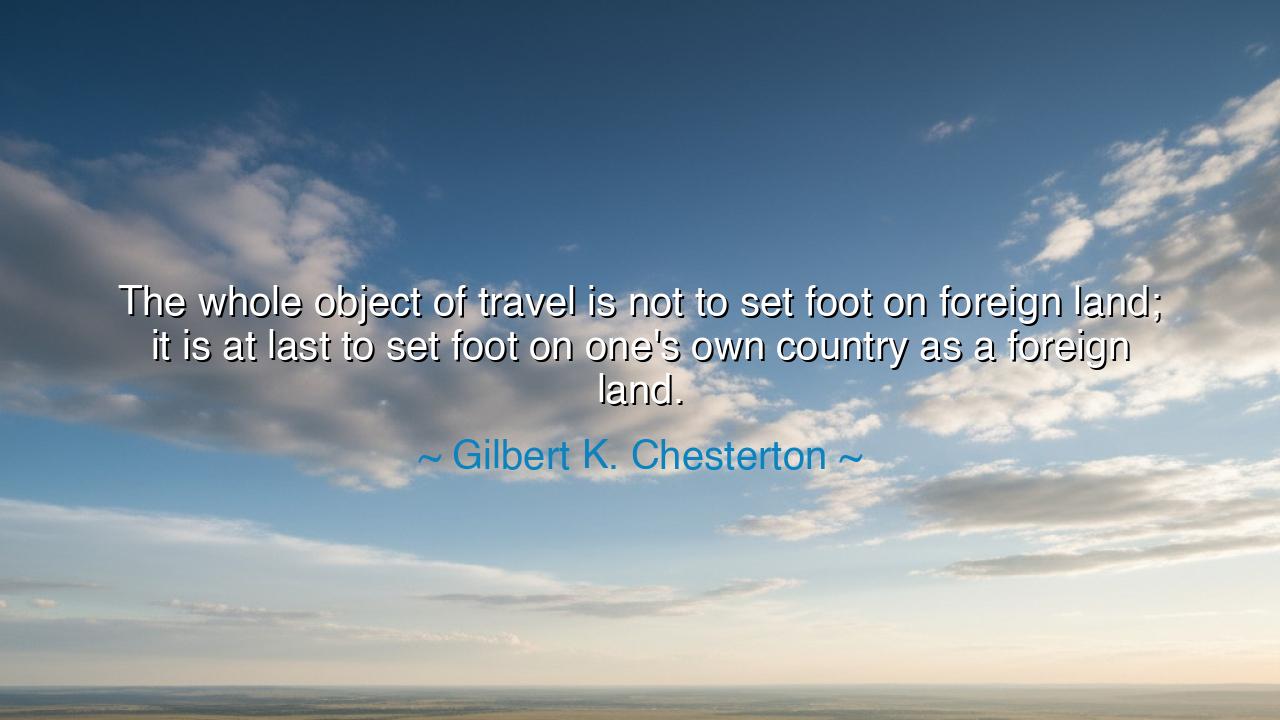
The whole object of travel is not to set foot on foreign land;
The whole object of travel is not to set foot on foreign land; it is at last to set foot on one's own country as a foreign land.






Gilbert K. Chesterton, that great knight of paradox and defender of wonder, once proclaimed: “The whole object of travel is not to set foot on foreign land; it is at last to set foot on one’s own country as a foreign land.” With these words, he shattered the common illusion that the purpose of the journey lies only in the distant and exotic. Rather, he teaches that the deepest purpose of travel is to transform the eyes of the traveler, so that upon return, the ordinary is made extraordinary, the familiar becomes as strange and marvelous as the farthest shore.
The first wisdom here lies in the idea of foreign land. Most men seek out other countries because they long for novelty—for new food, new tongues, new sights. They chase difference, hoping it will awaken something within them. Chesterton agrees that this is valuable, but he presses further: the true miracle is not to marvel at what is strange, but to regain the ability to marvel at what is familiar. To see one’s own home, one’s own streets, as if they were foreign is to recover the eyes of a child, who finds wonder not in distance but in presence.
This transformation of perception has deep roots. Consider the story of Odysseus, who after ten years of wandering, set foot once more upon the soil of Ithaca. For him, his home had become strange and wondrous through the lens of exile; he kissed the very earth with tears. What for years had been ordinary—a hearth, a wife, a son—now appeared radiant, as though it had been foreign all along. Odysseus’ return embodies Chesterton’s truth: travel alters the eyes, and through altered eyes, one’s own homeland is transfigured.
History offers another mirror in the life of Marco Polo. After decades in the service of Kublai Khan, Polo returned to Venice with stories of golden palaces, spices, and distant marvels. Yet for him, it was not only the East that shone with wonder—his own city, once familiar, was transformed by contrast. The canals of Venice, the merchants, the bells—these too became strange and precious after his long absence. To leave is to learn; to return is to see anew.
Chesterton’s words also strike against the sickness of boredom. The modern soul often believes that happiness lies elsewhere, across borders, in lands imagined as better. But Chesterton insists that the true joy is not in escaping one’s place, but in transforming one’s gaze. If you cannot see the wonder of your own street, then even if you cross oceans, you will remain blind. But if travel reawakens the sense of strangeness, then when you return, you will find that the miracle was never far—it was always at your doorstep.
The emotional power of his teaching is that it offers redemption for the ordinary. To set foot on one’s own country as a foreign land is to realize that the ordinary is sacred, that the familiar is filled with mystery. The tree in your yard, the face of your neighbor, the bread on your table—these can all be as wondrous as the pyramids or cathedrals if only you see them with awakened eyes. In this, Chesterton echoes the voice of the mystics, who proclaimed that God hides not in distant heavens but in the nearness of common things.
Thus the lesson is clear: travel not only to see the world, but to recover the ability to see your own world. Do not despise the familiar, for in truth, nothing is ordinary once your vision has been renewed. The journey outward is but the training ground for the journey homeward—the moment when you finally see where you are as if for the first time.
Practical counsel follows: when you return from a journey, do not let your eyes close again. Look at your street as if it were new. Taste your bread as if it were exotic. Greet your family as if they were precious strangers. Let travel be not escape, but revelation. For the true object, as Chesterton proclaims, is not to cross the seas, but to cross the veil of dullness that blinds the heart. Then, and only then, will you set foot on your country—and indeed on your own life—as though it were a wondrous foreign land.






AAdministratorAdministrator
Welcome, honored guests. Please leave a comment, we will respond soon